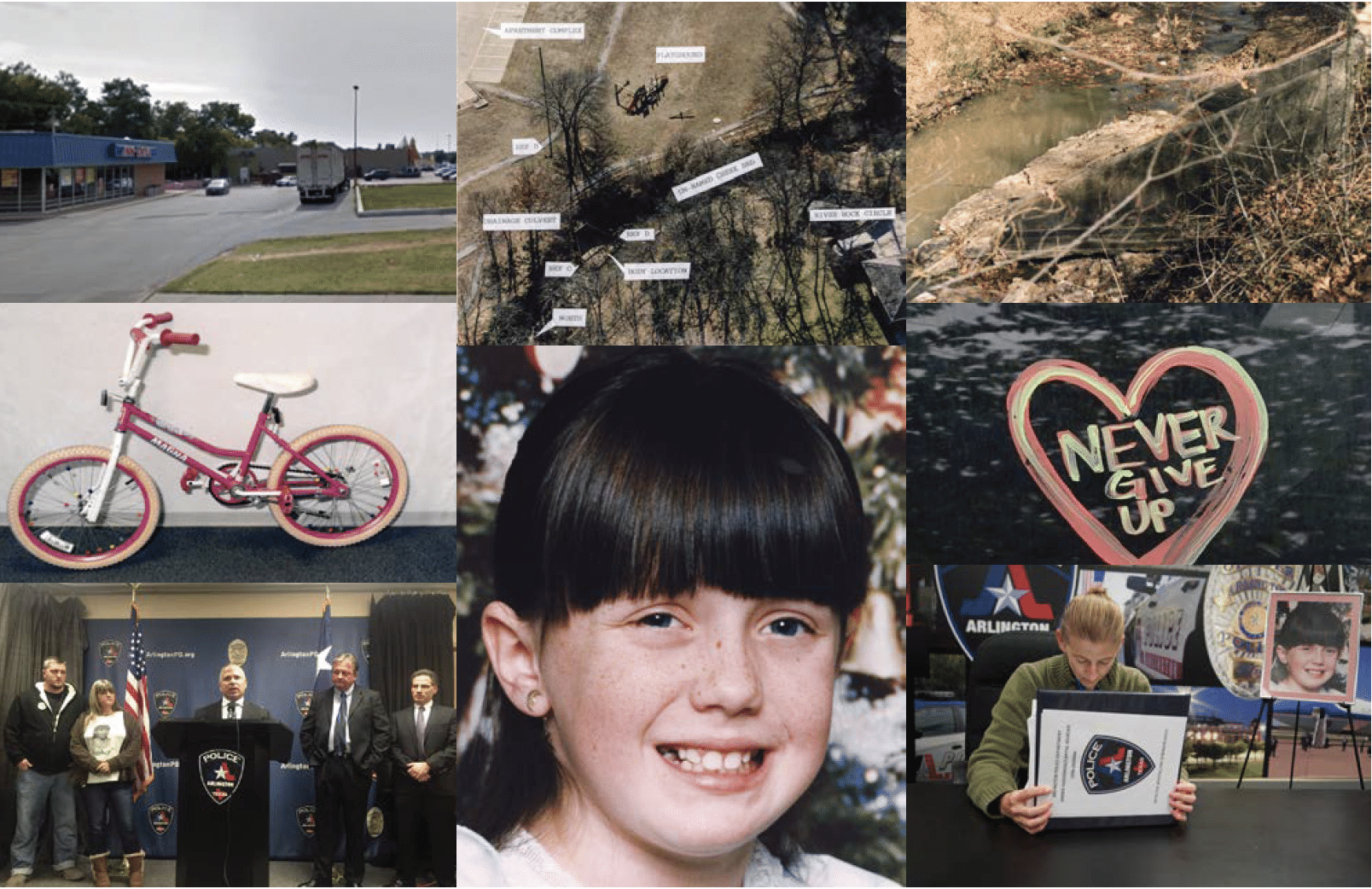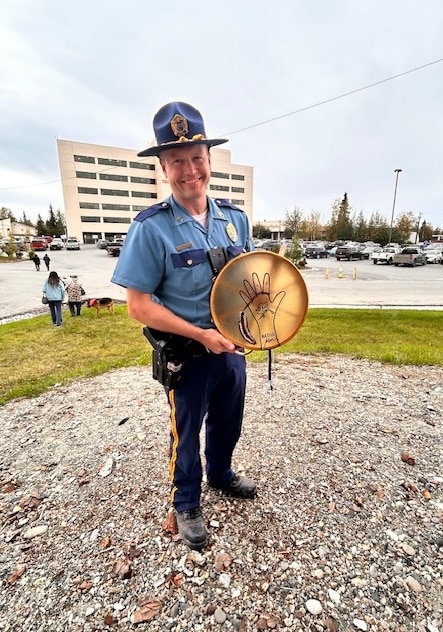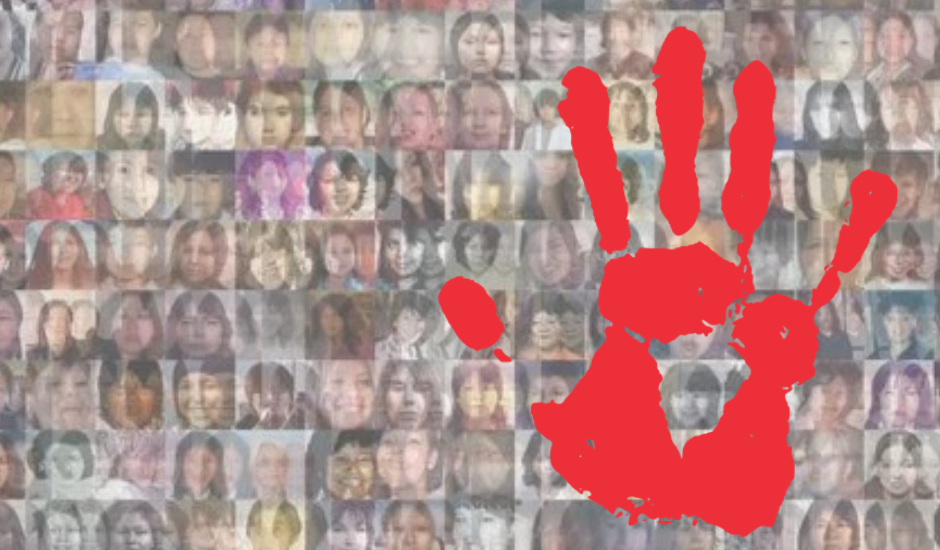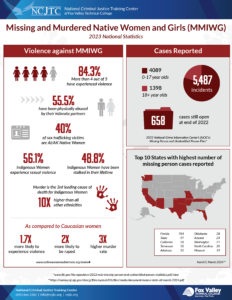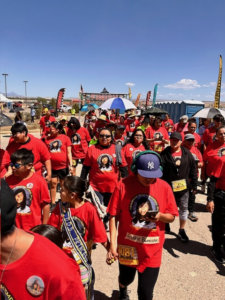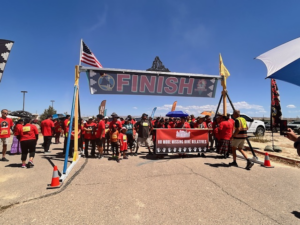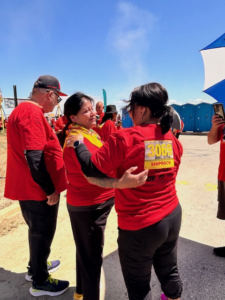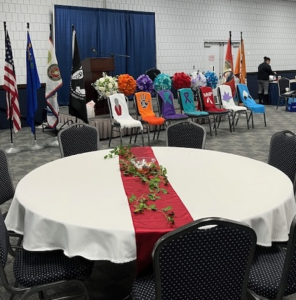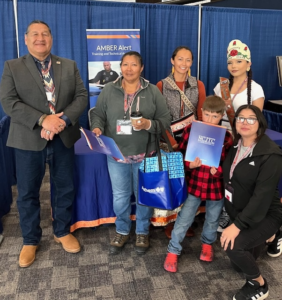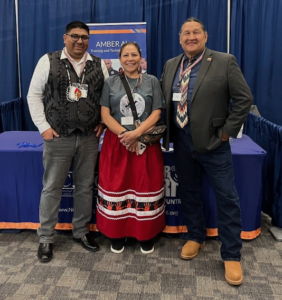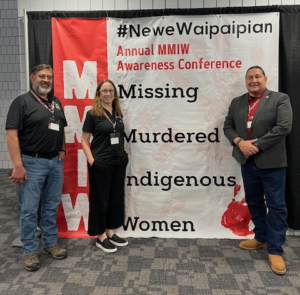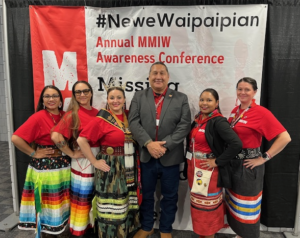Members of AATTAP’s AMBER Alert in Indian Country (AIIC) team attended a powerful missing and murdered Indigenous persons (MMIP) memorial bench dedication in Fairbanks, Alaska, hosted by the Tanana Chiefs Conference. The event brought together families, Tribal leaders, and community members to honor the lives of those tragically taken or still missing. The dedication included heartfelt speeches and the reading of 48 names, each one representing a person, a story, and a life stolen. “We are committed to working with our partners to ensure that every community has the resources to respond swiftly when a child goes missing and to honor those we’ve lost by protecting those still with us,” said AIIC Program Manager Tyesha M. Wood. Added AATTAP Administrator/National Criminal Justice Training Center Director Janell Rasmussen, “Being surrounded by families and communities who carry such a deep pain and resilience is a powerful reminder of why we do this work.”
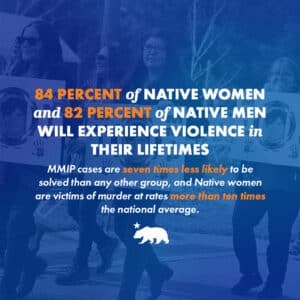
Native American Tribes in California are slated to begin a range of projects in conjunction with the state’s Missing and Murdered Indigenous People (MMIP) Grant Program. California awarded nearly $13 million in grants to support 15 projects led by Tribes or Tribal collaborations to address the MMIP crisis. The projects are designed to develop culturally based prevention strategies, strengthen community outreach, and improve responsiveness in missing persons cases. The Mechoopda Indian Tribe of Chico Rancheria plans to focus on youth programming, including establishing events to help youth understand the risks of trafficking. The Yurok Tribe’s grant includes hiring a full-time MMIP victim advocate, while the Round Valley Indian Tribe is eyeing a modular office building to use as an MMIP headquarters. The Pala Band of Mission Indians’ plans include purchasing a drone and providing training for volunteer search and rescue. The California Board of State and Community Corrections (BSCC) approved the grants under a program established in 2022.
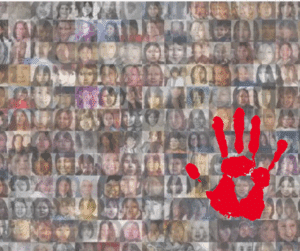
The New Mexico Missing and Murdered Indigenous People (MMIP) Task Force heard emotional testimonies as part of its ongoing efforts to address the MMIP crisis. Family members and others attending the group’s quarterly meeting recounted how Indigenous people have been impacted by human trafficking and the disproportionately high number of missing girls and women. Birga Alden, a task force member and chief communication officer at the nonprofit New Mexico Dream Center, emphasized the importance of hearing Indigenous voices and taking action. The task force, which collaborates with the New Mexico Department of Justice, is using its meetings to raise awareness of the MMIP crisis and to work toward updating a 2022 state response plan. That plan, released by the New Mexico Indian Affairs Department, outlines strategies to improve data collection and support for survivors and families.

The FBI is surging resources to investigate unsolved cases in Indian Country, including those relating to missing and murdered Indigenous persons (MMIP). As part of “Operation Not Forgotten,” 60 FBI agents will be temporarily deployed to 10 field offices nationwide to work in partnership with the Bureau of Indian Affairs (BIA) and Tribal law enforcement agencies across jurisdictions. The BIA’s Missing and Murdered Unit and the FBI will use advanced forensic technology in their efforts. The FBI’s Indian Country program had about 4,300 open investigations at the beginning of fiscal year 2025. U.S. Attorney General Pamela Bondi said that the collaboration will “help deliver the accountability that these communities deserve.” This is the third deployment under the operation, which has provided investigative support to more than 500 cases in the past two years and resulted in the recovery of 10 child victims and 52 arrests. Frank Star Comes Out, President of the Oglala Sioux Tribe in South Dakota, said he welcomes the additional resources, but added “we’re not done yet.”
By Denise Gee Peacock
May 5 is designated as the National Day of Awareness for Missing and Murdered Indigenous Persons (MMIP)/Missing and Murdered Indigenous Women and Girls (MMIWG). The day serves as a national call to action to end violence against Indigenous communities and to support families and communities impacted by the MMIP/MMIWG crisis.
Funded by the U.S. Department of Justice in support of the Ashlynne Mike AMBER Alert in Indian County Act, the AMBER Alert Training & Technical Assistance Program’s AMBER Alert in Indian Country (AIIC) initiative is committed to helping American Indian and Alaska Native Villages (AI/AN communities) combat the crisis by providing no-cost training, technology assistance, and numerous resources.
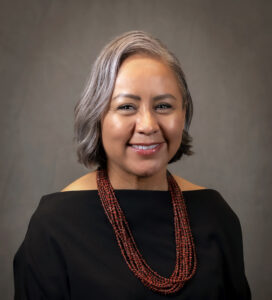
AMBER Alert in Indian Country Program Manager Tyesha Wood, and Project Coordinators Dave Chewiwie, Amy Hood-Schwindt, and Alica Murphy Wildcatt—are continually on the road meeting with federally recognized Tribes throughout the nation.
Their Indigenous heritage and law enforcement experience help them connect on multiple levels with AI/AN law enforcement and community leaders during AMBER Alert implementation meetings and child abduction tabletop exercises (CATEs). They also assist with specialized and/or customized training, partner outreach, and more.
“While our team proudly supports MMIP/MMIWG Awareness Day, our commitment extends beyond May 5,” says Program Manager Wood, a member of the Navajo Nation. “Every day we stand with the families of missing and murdered Indigenous people who are still seeking answers. We encourage everyone to listen and help people with cases that are unreported or under-investigated. Every voice matters—and every story deserves to be heard.”

Behind every missing or murdered Indigenous relative “is a family waiting, a community grieving, and a life full of potential that deserves to be seen and protected,” says Wildcatt, a member of the Eastern Band of Cherokee Indians.
Much like her AIIC colleagues, “I see firsthand how our systems have the potential to fall short. Delayed responses, jurisdictional barriers, and a lack of urgency can put Native lives at risk. We can’t let our relatives become statistics. The MMIP/MMIWG movement matters because it is about justice, yes, but it’s also about love, dignity, and the right to be safe in our own homeland.”

Children are precious in Native communities, but they also are vulnerable to “those who may be looking to abduct them, to exploit them,” says Project Coordinator Dave Chewiwie, a Pueblo of Isleta member. “We have to have effective programs and plans in place to safely recover them if they go missing. We are all stakeholders in the security of our children in Indian Country.”
Project Coordinator Hood-Schwindt, a Yavapai-Apache member, believes “an ongoing lack of thorough investigations into MMIP cases, combined with the impunity of perpetrators, has fueled a vicious cycle, one we need to break. We have to provide comprehensive investigations, meaningful prosecutions, and ensure there is justice for every stolen Indigenous life.”

While significant progress has been made in the last five years, much still needs to be done, Wood says. “We must work in unity, share resources and coordinate efforts, and carry hope that we will find, or find answers for, our missing and murdered Indigenous relatives.”
Wildcatt believes that “working together, we can confront this epidemic. We can invest in community-driven solutions, and build systems that ensure safety, accountability, and justice.”


Administrator, AMBER Alert Training & Technical Assistance Program/AMBER Alert in Indian Country initiative
‘Not Afraid’
AIIC Associate Jen Murphy helped produce an award-winning short film that turns a lens on the MMIP/MMIW crisis.
Jen Murphy is a photographer, artist, member of the Chippewa Cree Tribe in Montana, an AATTAP-AIIC Associate, and one of the more prominent faces of MMIP/MMIW awareness work. The above photograph of her with a red handprint over her mouth—symbolizing the silencing of voices—spans billboards across the Great Plains “to bring attention to issues that need to be talked about,” Murphy says.
Central among those issues is the disproportionate rate of violence, abduction, and murder experienced by women and people in the U.S. and Canada.

At just under 10 minutes, the film provides an intimate and powerful portrait of a young Native American woman navigating the grief of losing a loved one to the MMIW crisis. It captures both personal heartbreak and the deep resilience within Indigenous communities, and aims to be a stirring call to remembrance, justice, and healing.
Starring JaShaun St. John (“Songs My Brothers Taught Me”), the film offers a powerful, intimate look at a growing injustice impacting Indigenous families across North America.
“Not Afraid” was awarded the Indigenous Film and Culture Award from Windrider Film Showcase that runs with the Sundance Film Festival.
The film’s director, Michaela Bruce, says of Murphy—and their storytelling mission—“I feel on the deepest level that we have a responsibility to support vulnerable women through all means available to us, including the arts.”
“When we have the ability and resources to support an important work,” Murphy adds, “it is always the right thing to do.”

JEN MURPHY
AMBER Alert in Indian Country Associate / artist and filmmaker
Get the Facts About MMIP / MMIWG
Indigenous people—especially women and girls—experience significantly higher rates of violence, murder, and being reported missing compared to other groups.
- Find the latest statistics from the FBI here and view the National Criminal Justice Training center infographic (shown below right; click photo to enlarge).
- Learn more about national MMIP/MMIWG efforts here and here.
- Access the DOJ resource When a Loved One Goes Missing: Resources for Families of Missing American Indian and Alaska Native Adults (shown below left) here.
Moved to Act: AIIC Team Participates in Ashlynne Mike, MMIWG Events
Walking the Walk for Ashlynne Mike & MMIP/MMIWG Awareness
Alica Murphy Wildcatt, Project Coordinator for AATTAP’s AMBER Alert in Indian Country (AIIC) initiative, participated in the Ashlynne Mike Memorial Mile Walk & Run held in Shiprock, New Mexico, on May 2.
The event drew 111 people—the largest number of participants to date. Attendees walked and/or ran in honor of Ashlynne—namesake of the Ashlynne Mike AMBER Alert in Indian Country Act of 2018, which the AIIC initiative works to support.
The event also served to raise awareness of Missing and Murdered Indigenous Women & Girls (MMIWG) National Day of Awareness May 5.
“𝘛𝘩𝘦 𝘥𝘢𝘺 𝘸𝘢𝘴 𝘢 𝘱𝘰𝘸𝘦𝘳𝘧𝘶𝘭 𝘳𝘦𝘮𝘪𝘯𝘥𝘦𝘳 𝘰𝘧 𝘵𝘩𝘦 𝘸𝘰𝘳𝘬 𝘴𝘵𝘪𝘭𝘭 𝘯𝘦𝘦𝘥𝘦𝘥 𝘵𝘰 𝘱𝘳𝘰𝘵𝘦𝘤𝘵 𝘕𝘢𝘵𝘪𝘷𝘦 𝘤𝘩𝘪𝘭𝘥𝘳𝘦𝘯,” 𝘞𝘪𝘭𝘥𝘤𝘢𝘵𝘵 𝘴𝘢𝘺𝘴. “𝘞𝘦 𝘸𝘢𝘯𝘵 𝘵𝘰 𝘦𝘯𝘴𝘶𝘳𝘦 𝘵𝘩𝘦 𝘮𝘪𝘴𝘴𝘪𝘯𝘨 𝘢𝘳𝘦 𝘯𝘰𝘵 𝘧𝘰𝘳𝘨𝘰𝘵𝘵𝘦𝘯—𝘢𝘯𝘥 𝘵𝘩𝘦𝘪𝘳 𝘧𝘢𝘮𝘪𝘭𝘪𝘦𝘴’ 𝘷𝘰𝘪𝘤𝘦𝘴 𝘤𝘰𝘯𝘵𝘪𝘯𝘶𝘦 𝘵𝘰 𝘣𝘦 𝘩𝘦𝘢𝘳𝘥.”
AIIC Training & Resources Highlighted in Nevada
AIIC Project Coordinator David Chewiwie attended the Newe Waipaipian Missing and Murdered Indigenous Persons (MMIP) and Women (MMIW) Native Conference May 3–7 in Elko, Nevada. The conference drew numerous Indian Country Tribal leaders, Native advocates, law enforcement partners, and community members from throughout Nevada.
Chewiwie gave a presentation about the AIIC, and oversaw the information table for the National Criminal Justice Training Center/AMBER Alert Training & Technical Assistance Program/AIIC initiative, which provides a variety of free training, resources, and technological assistance to Native communities. (Learn more at here.)
“AMBER Alert in Indian country was very well received by conference organizers and attendees,” Chewiwie said. “We’ve already received an invitation to participate in next year's conference.”

A new measure will require law enforcement authorities in California to collect and provide information on crimes that occur on Native American lands. Under the mandate signedby Governor Gavin Newsom, the data must be provided to the California Department of Justice to help better address the Missing and Murdered Indigenous Persons (MMIP) crisis and collaboratively work toward improving public safety and justice in Indian Country. California is home to the second-highest number of federally recognized Native American Tribes in the United States and ranks fifth in the nation in unresolved MMIP cases.
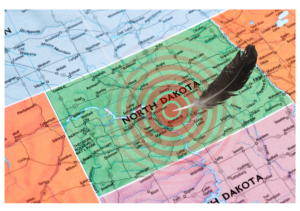
Noting that eight Indigenous youth under the age of 18 had gone missing in the first five weeks of 2025, North Dakota Representative Jayme Davis introduced a bill urging state lawmakers to pass a Feather Alert to help safely recover missing persons from Tribal communities. The alert would be “another tool in our toolbox” to combat the crisis of missing and murdered Indigenous people, said Davis, an enrolled member of the Turtle Mountain Band of Chippewa. “This is not just a Tribal issue—it is a North Dakota issue, and it is our responsibility to act,” Davis noted in pushing the measure forward. The Feather Alert would only be activated at the state level after meeting strict criteria, comparable to an AMBER Alert, in which the missing person is believed to be in danger and there is information about the vehicle, person, or abductor. California is currently the only state with a Feather Alert. In addition to the new alert, North Dakota lawmakers have also been considering a measure to create a task force designed to fill communication gaps among Tribal, federal, state, and local agencies.
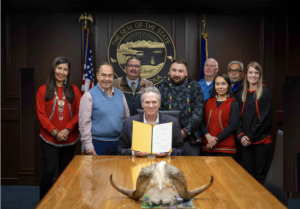
Alaska is ushering in the new year with an increased focus on the Missing and Murdered Indigenous Persons (MMIP) crisis. New legislation signed by Governor Mike Dunleavy requires Indigenous cultural training for new police officers, an assessment of the Department of Public Safety’s investigative resources for reporting MMIP cases, and the establishment of a commission to review and report on unsolved cases. Deilah Johnson, an advocate with the Village of Solomon Tribe, calls the commission a much-needed step. “At the state level, there was just not a lot of discussion or acknowledgment in addressing any of the overwhelming statistics surrounding the issues facing Indigenous populations, specifically women and young girls,” Johnson said. The nine-member commission, which includes seats for victim advocacy and Alaska Native Tribal organizations, will report findings to the Alaska Legislature. Johnson hopes the new measures will continue to generate awareness about MMIP and inspire partnerships to build additional resources.
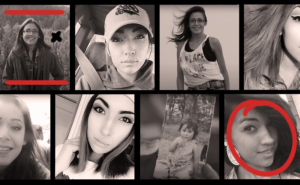
Saying that there is “still so much more to do,” U.S. Attorney General Merrick B. Garland vowed to continue prioritizing efforts to combat the Missing or Murdered Indigenous Persons (MMIP) crisis. Initiatives include the U.S. Department of Justice’s (DOJ) MMIP Regional Outreach Program which places attorneys and coordinators in regions across the U.S. to help prevent and respond in MMIP cases. And during a visit to the Crow Indian Reservation in Montana, Garland announced that, based on the Not Invisible Act Commission’s recommendations, DOJ is working to improve funding, enhance research to better trace underlying causes, and develop guidance on engaging the public when someone is reported missing. “Tribal communities deserve safety, and they deserve justice,” Garland said in highlighting some of the efforts on National Missing or Murdered Indigenous Persons Awareness Day in May. “This day challenges all of us at the Justice Department to double down on our efforts, and be true partners with Tribal communities.”
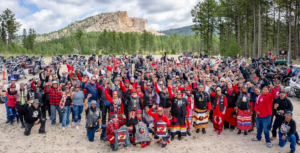
Indigenous female motorcyclists continue to rev up their engines—as well as their messaging—to raise awareness about the high rate of missing and murdered girls and women in Native American communities. This past July, the Medicine Wheel Ride motorcycle group from Phoenix partnered with the Santa Ynez Band of Chumash Indians in Santa Barbara County, California, for a “We Ride for Her” event. Organized through the Santa Ynez Tribal Health Clinic, the event featured a screening of the “We Ride for Her” documentary highlighting the motorcycle group’s work, which includes fundraising, assisting advocates searching for missing Native American girls and women, and raising awareness through annual rallies and rides. The Santa Ynez Band of Chumash Indians remains the only federally recognized Chumash Tribe in the nation.
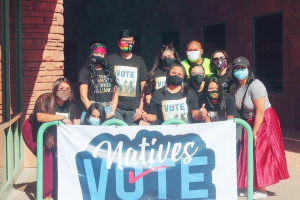
Native American voters could decide major elections in 2024, and grassroots efforts are underway across swing states to get this important electorate out to vote as Democrats and Republicans vie for power. Key issues for Native Americans, particularly Native American women, include the high rate of missing and murdered Indigenous women, according to a 2023 First Nations Development Institute (FNDI) National Survey of Native Americans. This demographic is a powerful voting bloc with at least five million voters in the U.S. who identify as Native and Alaska Natives, the U.S. Census Bureau estimates.
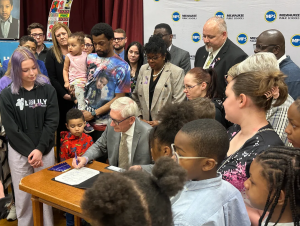
Wisconsin Governor Tony Evers signed dozens of bills in March that would invest $10 million in support of crime and human trafficking victims. A new formal partnership between Wisconsin Anti-Human Trafficking Task Force (WAHTTF) and the Missing and Murdered Indigenous Women and Relatives (MMIWR) addresses the prevalence of human trafficking in Wisconsin’s Indigenous communities. In April, Wisconsin signed two new missing person alerts into law, an effort to strengthen the state’s existing AMBER Alert system. The Prince Act expands Wisconsin’s missing person alerts for children after the murders of 5-year-old Prince McCree in 2023 and 10-year-old Lily Peters in 2022. In both cases, law enforcement didn’t have enough information to satisfy the strict requirements for issuing an AMBER Alert. As part of the Act, a new Purple Alert includes missing children under age 10 and children under the age of 18 incapable of returning home without help due to a disability.

